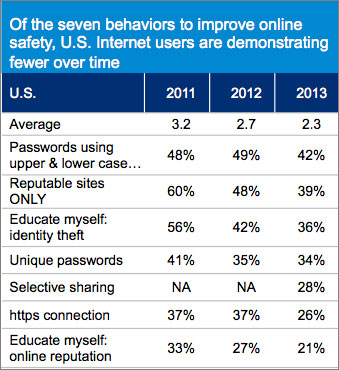US Internet users less vigilant than ever about their online safety
As the Internet has become a ubiquitous part of life, US consumers are less vigilant about protecting their safety online, says this year’s Microsoft Computing Safety Index (MCSI) for the US.
Launched in 2011, the Index was created to track and gauge consumer online safety behaviors and to measure their experience online.
In 2012, the MCSI was expanded to a global survey, along with the addition of a mobile computing survey component. This year it includes 20 countries, comprising 60 percent of the globe’s 2.4B Internet users.
The survey contains more than 20 steps consumers can take to help protect themselves online. The more steps they report taking, the higher their online safety score; 100 is the highest rating possible.
This year’s statistics are as follows:
Most of the polled people report not leveraging the basic tools that could stave off trouble:
Many report not doing risky behaviors, but miss active steps to thwart socially-engineered risks:

And fewer than half are taking actions to stay safe:

Looking year over year, this year’s US score indicates a decline in consumer behaviors when it comes to taking proactive steps that help protect themselves online.
Compared with 2012, this year’s scores were down slightly overall (36 in 2012 vs. 34 in 2013) with a downturn in implementing technical protections, like using phishing and web browser filters, and behavioral protections, like creating a unique passwords for each account.
